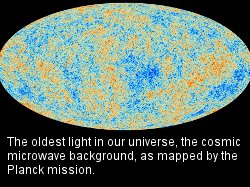Origin of the Universe

The Origin of the Universe Group (3268) aims to characterize the fundamental origin and composition of the universe, from the inflationary era onwards, through theoretical modeling of astrophysical and cosmological phenomena; development of data analysis and science extraction enabling frameworks to support the ongoing and future space missions, and suborbital observing efforts; the design and implementation of enabling detector technologies; and observations of the universe on large scales as well as distant objects revealed through the same observations.
Key science questions our group is focused to addressing include:
- What is the origin of the Universe?
- What is the nature of Dark Energy?
- What will gravitational waves reveal?
Origin of the Universe: Missions and Projects
- BICEP
- BICEP2
- BICEP3
- DESI
- DES
- Planck
- Euclid
- Hubble
- Juno
- JWST
- LISA
- Nancy Grace Roman Space Telescope
- PFS
- Roman
- SPIDER
- SPHEREx
- Spitzer
- Subaru Telescope
- TIM Experiment
The group members are studying the history of the Universe from the Big Bang, through reionization era, up to the present day. Microwave observations from the Planck spacecraft, and ground-based experiments such as BICEP2, enabled determination of key parameters of the currently accepted Lambda-CDM cosmological model with unprecedented accuracy. The ongoing investigations in this area are searching for evidence of primordial gravitational waves from the Big Bang. The new technique of intensity mapping at frequencies from the infra-red to radio will attempt to reveal the large-scale structure of the Universe throughout its history. JPL cosmologists are also aiming to explain the nature of Dark Energy, a hypothetical cause for the accelerated expansion of the Universe in recent times. For this they use ground-based facilities such as the Prime Focus Spectrograph on the Subaru Telescope, and DESI, plan future missions such as Euclid or Roman Space Telescope (formerly known as WFIRST), and develop advanced technologies for future space-based astrophysics missions. These technologies could provide new capabilities for sensitive astronomical observations and gather a broad range of information in all areas including photometry, polarization and spectroscopy. JPL researchers are involved in developing tools to study a rich and diverse set of astrophysical data already obtained with a number of ground-based and space telescopes, including Hubble, Spitzer, Planck, and JUNO, as well as those coming in the future including Euclid, Roman, LISA and SPHEREx.